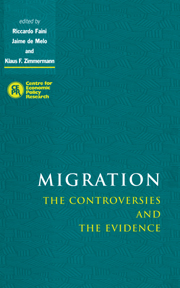Book contents
Foreword
Published online by Cambridge University Press: 10 May 2010
Summary
Trade and migration have often been considered as substitutes. Economic theory treats international trade as the result of differences in factor endowments. Goods thus embody capital and labour, and trade in goods is thus indirectly trade in factors such as labour. Trade in goods embodying labour is thus a substitute for the movement of labour itself. A similar perspective informs policy discussions concerning migration. Increased trade, by fostering the growth of income and wages in poorer countries, can reduce the incentive for migration from the poorer to the richer countries. The historical evidence seems more mixed, however. The rapid growth of trade which took place the turn of the century, and again in the post-war period, was accompanied by more, not less, migration. In the 1980s and 1990s, on the other hand, trade grew rapidly without any corresponding growth of migration.
The CEPR has played an active role in the economic analysis of European migrations, beginning with an exploratory workshop in 1985, organised by Louka Katseli, followed by research networks in the late 1990s, funded by the European Commission's SPES and HCM Programmes.
This volume draws on the work of these networks, and in particular on the papers presented at a conference on ‘Trade and Factor Mobility’, held in Venice on 24–25 January 1997. The conference was organised as part of the Centre's research programme on ‘European Migration: From Economic Analysis to Policy Response’, led by Klaus F. Zimmermann and supported by the European Commission's Human Capital and Mobility Programme.
- Type
- Chapter
- Information
- MigrationThe Controversies and the Evidence, pp. xvPublisher: Cambridge University PressPrint publication year: 1999



